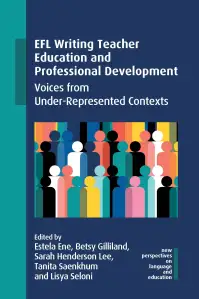This month we published EFL Writing Teacher Education and Professional Development edited by Estela Ene, Betsy Gilliland, Sarah Henderson Lee, Tanita Saenkhum and Lisya Seloni. In this post the editors explain the importance of studying local contexts and how they shape the pedagogical landscape of EFL writing teachers.
 What do geopolitics and socioeconomics have to do with the English classroom and the skill of teaching English language writing? In our recently published book with Multilingual Matters, EFL Writing Teacher Education and Professional Development, we go beyond the traditional boundaries of English writing education to investigate how diverse regions that are mostly underrepresented in the research literature shape the pedagogical landscape of EFL writing teachers.
What do geopolitics and socioeconomics have to do with the English classroom and the skill of teaching English language writing? In our recently published book with Multilingual Matters, EFL Writing Teacher Education and Professional Development, we go beyond the traditional boundaries of English writing education to investigate how diverse regions that are mostly underrepresented in the research literature shape the pedagogical landscape of EFL writing teachers.
Well over a billion individuals speak English as a foreign language around the world today. There are millions of English language teachers globally, working in schools, language institutes, universities, online platforms, and private tutoring settings. It is important, therefore, to document EFL experiences of learning and teacher education and allow them to inform theories and practices of second language writing that are still US-centric. It is to these less represented narratives, research, and stories that we need to listen to gain a deeper understanding of local practices and eventually work to develop a sustainable and ecologically responsible writing curriculum.
This timely collection sheds light on often-overlooked areas of the globe, exposing how local settings from Rwanda to Japan, Kazakhstan, and Argentina present distinct challenges and opportunities for EFL teaching and the training of EFL writing teachers. We hope to foster a deeper, more inclusive narrative of EFL writing education by weaving together the stories of practitioners and researchers from all backgrounds – one that respects and represents the diversity of voices contributing to this subject.
Our book offers teacher reflections, action research, and models of resources that can be adapted to other contexts. Chapters illustrate how educators modify their approaches to fit within the educational, cultural, and political contexts in which they work. In doing this, they also challenge the status quo and overcome the challenge of having to be the main drivers of their own professional development. For example, teachers of minority students in China show how they move away from exam-focused instruction, negotiating the advantages and disadvantages of this shift. Teachers in Japan, Chile, and Algeria reflect on their personal journeys toward student-centered, real-world writing pedagogies. A teacher educator in Turkiye describes activities that engage learners in exploring written genres through creativity. Iranian English teachers reveal that given the political and educational environments in two eras of Iranian history, primary and secondary school students have limited opportunities to learn how to write for communicative purposes. These and many other chapters illustrate the breadth of innovation and investment teachers and teacher educators have made in EFL writing across the globe.
Our book invites academics, policymakers, and educators to take a more comprehensive look at the global scene of EFL writing instruction. It is an appeal to acknowledge and honor the various ways that educators worldwide are advancing the subject of EFL writing, frequently under challenging situations and with limited resources.
For individuals fascinated by the complicated dance of teaching writing in various global contexts, our book provides a glimpse into EFL educators’ innovative and resilient practices worldwide. We invite you to go through these pages, as each chapter demonstrates the ingenuity and passion of teachers who shape the next generation of English authors.
If this topic speaks to you, or if you have your tales about the problems and triumphs of teaching EFL writing, we would love to hear from you. Let us continue to learn from one another, forming a worldwide community of educators united in our dedication to developing proficient, confident writers across boundaries.
For more information about this book please see our website.
If you found this interesting, you might also like Second Language Writing Instruction in Global Contexts edited by Lisya Seloni and Sarah Henderson Lee.